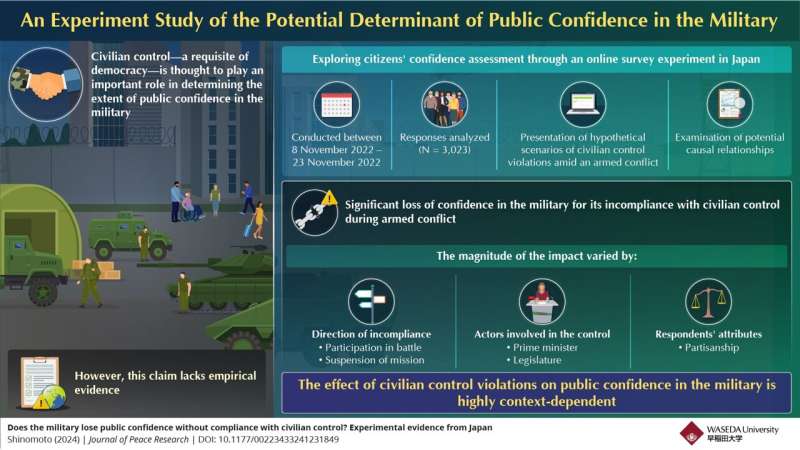Exploring the relationship between civilians and military organizations through an experiment in Japan

In democracies where civilian control is followed, the power to make crucial decisions, like those of national security, is mainly exercised by elected officials, allowing the citizens who elect them to influence such decisions indirectly. This role can give people a sense of participation in matters of national importance, potentially associated with their political trust.
The military, in such cases, advises and helps these elected leaders in serving the nation, rather than assuming leadership itself. A balance between civilians and military organizations is, therefore, crucial for any democracy to thrive, and it is pointed out that civilian control is a requisite of democracy.
Existing studies of civil–military relations have indicated that the military's compliance with civilian control is a determining factor in public confidence in the military. However, this claim has not been thoroughly developed theoretically and lacks empirical evidence.
Additionally, a majority of relevant studies have focused on the U.S., leaving the relationship between public confidence in the military and civilian control in other political environments particularly poorly understood.
Against this backdrop, Sou Shinomoto, a Junior Researcher at the Waseda Institute of Political Economy, Waseda University, Japan, conducted an empirical study now published in the Journal of Peace Research on May 16, 2024.
It investigates the causal relationship between the military's compliance with civilian control and public confidence in the military. Moreover, the study examined whether and how the impact of deviation from civilian control on public trust differs in various settings: the directions of incompliance, the actors involved in control, and the respondents' attributes.
Shinomoto emphasizes, "The relationship between civilians and military organizations is intricate and politically important, which has garnered significant attention. However, discussions on this topic are frequently based on impressionistic arguments rather than careful analysis of objective, verifiable data. This gap in the literature motivated my research."
To this end, an online survey experiment was conducted among Japanese participants in November 2022. The study chose Japan as a research field since it is an established democracy with a considerable armed force.
Participants were initially asked to provide their demographic and socioeconomic information, followed by questions regarding their political attitudes. Next, they were presented with a hypothetical scenario of an armed conflict between the U.S. and Iran, where a Japan Self-Defense Forces (JSDF) unit was dispatched by the Liberal Democratic Party (LDP) Prime Minister to provide logistical support to U.S. forces.
In the treatment condition scenarios, the commanding officer considered the mission unwise and chose to act contrary to civilian control, either through arbitrary action or inaction.
After reading the fictional scenario, participants rated their confidence in the JSDF. Subsequently, they were presented with additional information about how the Diet (Japan's national legislature) was involved in controlling the JSDF regarding the mission.
Upon reading the extra text, participants again indicated their confidence in the JSDF. The data obtained from the experiment were statistically analyzed.
Notably, participants significantly lost confidence in the JSDF when it violated civilian control, particularly when the commander chose to engage in battle without authorization. However, there was only a slight decline in confidence when the commander arbitrarily suspended the mission.
Surprisingly, the information about the Diet's involvement did not significantly affect participants' confidence assessments. This indifference could imply that the people in Japan possibly do not place much weight on the potential positive implications derived from the legislature's involvement. Alternatively, they may not trust the Diet itself enough to expect such benefits from its involvement.
Moreover, there was no significant difference in post-treatment participants' trust in the JSDF based on their political ideology, suggesting that ideology may not be sufficiently strong to serve as a social identity that generates in-group bias, at least in Japan.
Furthermore, compared to LDP supporters, non-LDP supporters lost less confidence in the JSDF when the commander of the dispatched unit arbitrarily suspended the mission. Conversely, regardless of their party support, participants almost homogeneously and considerably lost trust in the JSDF when the commander arbitrarily decided to engage in battle.
Yet, the findings still indicate a slight partisan bias, highlighting concerns about its impact on public trust and possible broader ramifications.
Overall, these findings suggest that public confidence in the military is highly context-dependent. Elaborating further, Shinomoto says, "Even in Japan, which is a (supposed) established democracy, people don't always firmly advocate for civilian control and, in turn, democracy.
"This raises concerns about democracy's stability in modern society. Additionally, this study offers insights into international security dynamics and facilitates further understanding of how people in Japan, with its rapid development of defense capabilities, view the military's control and evaluate this organization."
More information: Sou Shinomoto, Does the military lose public confidence without compliance with civilian control? Experimental evidence from Japan, Journal of Peace Research (2024). DOI: 10.1177/00223433241231849
No comments:
Post a Comment